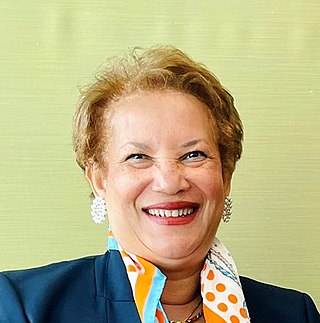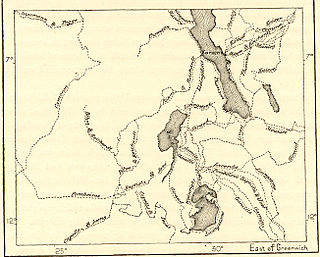
The United Nations Secretariat is one of the six principal organs of the United Nations (UN), The secretariat is the UN's executive arm. The secretariat has an important role in setting the agenda for the deliberative and decision-making bodies of the UN, and the implementation of the decision of these bodies. The secretary-general, who is appointed by the General Assembly, is the head of the secretariat.

An internally displaced person (IDP) is someone who is forced to leave their home but who remains within their country's borders. They are often referred to as refugees, although they do not fall within the legal definitions of a refugee.

The United Nations Mission in Liberia (UNMIL) was a United Nations peacekeeping operation established in September 2003 to monitor a ceasefire agreement in Liberia following the resignation of President Charles Taylor and the conclusion of the Second Liberian Civil War (1999–2003). At its peak it consisted of up to 15,000 UN military personnel and 1,115 police officers, along with civilian political advisors and aid workers.

Speciosa Naigaga Wandira Kazibwe, is a Ugandan politician and first female vice president in Africa. She was the sixth vice president of Uganda from 1994 to 2003, making her the first woman in Africa to hold the position of vice-president of a sovereign nation. Dr. Speciosa Kazibwe is also a Ugandan surgeon. She is also referred to as "Nnalongo", because of her twins. In August 2013, she was appointed by United Nations Secretary-General Ban Ki-moon as United Nations Special Envoy for HIV/AIDS in Africa.

An under-secretary-general of the United Nations (USG) is a senior official within the United Nations System, normally appointed by the General Assembly on the recommendation of the secretary-general for a renewable term of four years. Under-secretary-general is the third highest rank in the United Nations, after the secretary-general and the deputy secretary-general. The rank is held by the heads of different UN entities, certain high officials of the United Nations Secretariat, and high-level envoys. The United Nations regards the rank as equal to that of a cabinet minister of a member state, and under-secretaries-general have diplomatic immunity under the UN Charter.
The United Nations Institute for Disarmament Research (UNIDIR) is a research institute of the United Nations focused on disarmament and international security. It was established in 1980 by the United Nations General Assembly with the stated purpose of informing states and the global community on questions of international security, and to assist with disarmament efforts so as to facilitate progress toward greater security and economic and social development for all.

The Department of Peace Operations (DPO) is a department of the United Nations charged with the planning, preparation, management, and direction of UN peacekeeping operations. Previously known as the Department of Peacekeeping Operations (DPKO), it was created in 1992 as part of a restructuring of the UN's peace and security apparatus. The DPO retains the core functions and responsibilities of its predecessor, with a greater emphasis on cohesion, integrating different resources and knowledge, and promoting human rights.

The United Nations Integrated Mission in East Timor (UNMIT) was established on 25 August 2006 by UN Security Council Resolution 1704. Its objectives are "to support the Government in consolidating stability, enhancing a culture of democratic governance, and facilitating political dialogue among Timorese stakeholders, in their efforts to bring about a process of national reconciliation and to foster social cohesion". In its most recent resolution on UNMIT, the Council extended its mandate until 26 February 2012. UNMIT and ISF troops left the country at the end of 2012.

Angela Evelyn Vernon King was a Jamaican diplomat. She worked for the United Nations for 38 years, from 1966 to 2004, working mainly for equal rights for women. She was appointed Assistant Secretary-General for gender issues in 1997, remaining in that post until she retired in 2004.
International Women's Year (IWY) was the name given to 1975 by the United Nations. Since that year March 8 has been celebrated as International Women's Day, and the United Nations Decade for Women, from 1976 to 1985, was also established.
Paula Donovan is an American AIDS and women's rights activist. She is the co-executive director with Stephen Lewis of AIDS-Free World, an international advocacy organization that works to promote more urgent and effective global responses to HIV/AIDS. In recognition of her work in HIV/AIDS advocacy, Donovan received the Salem Award for Human Rights and Social Justice in 2005 and an alumni humanitarian award from Fairfield University in 2007.

Noeleen Heyzer is a Singaporean social scientist, diplomat, and United Nations official who was the United Nations Special Envoy on Myanmar from October 2021 until June 2023.

Catherine Pollard is a diplomat who has been serving as Under Secretary-General of the United Nations for Management Strategy, Policy and Compliance since 2019. From 2015 until 2019, she was the Coordinator for Multilingualism for the United Nations; in this capacity, she also served as Under Secretary-General of the United Nations for General Assembly and Conference Management.

Jan Margaret Beagle is a New Zealand diplomat who has been serving as the Director-General of the International Development Law Organization (IDLO) since 2020. From 2017 until 2019, she was the Under-Secretary-General of the United Nations for Management, appointed to this position by United Nations Secretary-General António Guterres on 1 June 2017. She then served as Special Advisor to the Secretary-General on Systemwide Implementation of Chief Executive Board decisions.

United Nations Security Council resolution 1493, adopted unanimously on 28 July 2003, after recalling all resolutions on the situation in the Democratic Republic of the Congo, the council extended the mandate of the United Nations Mission in the Democratic Republic of Congo (MONUC) until 30 July 2004 and raised its troop level from 8,700 to 10,800.
The United Nations Entity for Gender Equality and the Empowerment of Women, also known as UN Women, is a United Nations entity charged with working for gender equality and the empowerment of women. UN Women is charged with advocating for the rights of women and girls, and focusing on a number of issues, including violence against women and violence against LGBT people.

United Nations Security Council Resolution 1653, adopted unanimously on January 27, 2006, after recalling previous resolutions concerning the situations in the African Great Lakes region, Democratic Republic of the Congo and Burundi, particularly resolutions 1625 (2005), 1631 (2005), 1649 (2005) and 1650 (2005), the Council addressed the stability of the Great Lakes region in Africa.

Michael Møller is president of the Diplomatic Forum of the Geneva Science and Diplomacy Anticipator Foundation, principal advisor at Macro Advisory Partners and member of the boards of several foundations, including the Kofi Annan Foundation. He is Honorary President of the Association of Former International Civil Sevants for Development (Greycells). He is a Danish former Under-Secretary-General of the United Nations and the 12th director-general of the United Nations Office at Geneva (UNOG). He was also the secretary-general of the Conference on Disarmament and the United Nations Secretary-General's personal representative to the conference. He was appointed to these roles by Secretary-General Ban Ki-moon in November 2013 and was reappointed by Secretary-General António Guterres in February 2017 for another year. Møller has over 40 years of experience as an international civil servant in the United Nations System, serving in different roles in New York, Iran, Mexico, Haiti and Geneva. Prior to his tenure as director-general, he was the executive director of the Kofi Annan Foundation from 2008 to 2011.
Florence Ndagire is a female Ugandan lawyer, who works as a legal researcher and human rights lawyer at the United Nations (UN) based in Geneva, Switzerland. Ndagire, who is totally blind, also serves as the chairperson of the UN Women Regional Group, for Eastern and Southern Africa, comprising twelve countries. She is the first visually impaired person, male or female to qualify and receive licensure as a lawyer in Uganda.
The Declaration on the Rights of Peasants is a United Nations General Assembly resolution on human rights with "universal understanding", adopted by the United Nations in 2018. The resolution was passed by a vote of 121-8, with 54 members abstaining.










